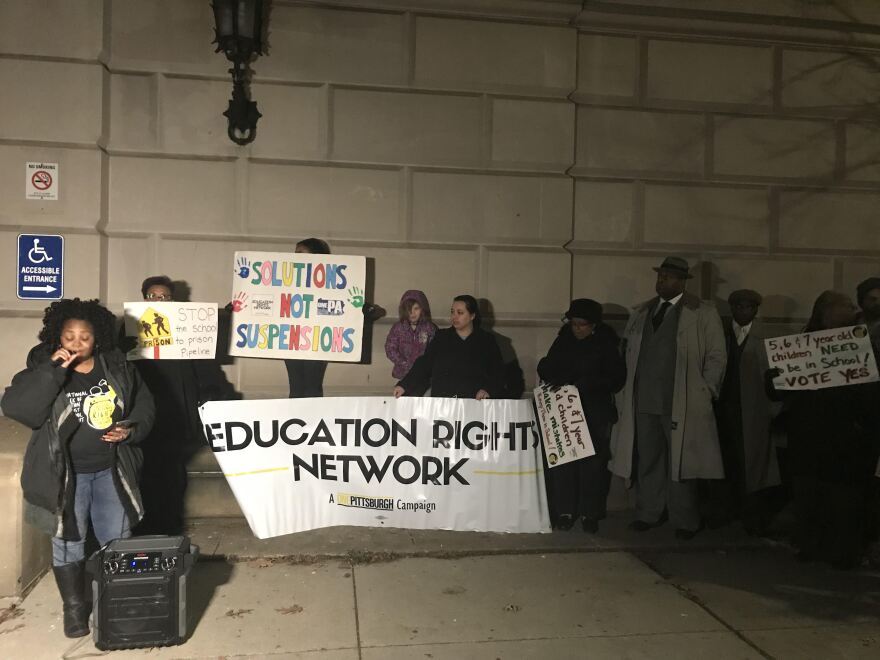Beginning in the 2018 school year, students below the third grade in Pittsburgh Public Schools will not be suspended for nonviolent offenses.
Board members and advocacy groups have pushed for the policy change for several months. According to the local advocacy group, the Education Rights Network, students below third grade missed nearly 800 days of school last year due to suspensions. A disproportionate number of those students were black. The group received that information from a Right To Know request.
The district amended the code of student conduct last year to discourage suspensions in those grades. So far this school year, only seven days have been missed for non-violent infractions, according to Superintendent Anthony Hamlet.
The board voted 7-2 Wednesday evening to discontinue use of suspensions in kindergarten through second grade. Cynthia Falls said she was voting against the measure because of concern raised in a letter sent to board members Wednesday morning from the Pittsburgh Administrators Association.
The group of Pittsburgh principals requested a delay in the suspension elimination vote, “until all district staff receive the necessary information, resources, and training.”
“Your vote will be detrimental to the overall management and well-being of Principals and school-based staff throughout the City of Pittsburgh without proper implementation,” the letter signed by 32 elementary school principals stated.
Hamlet pointed out that the principals were misinformed because the letter addresses banning all suspensions, while the board was voting on suspensions for minor infractions such as repeated tardiness or dress code violations.
Terry Kennedy voted against the policy change citing concern that an implementation plan has not yet been presented to the board about what classroom supports would be needed and provided to schools.
The board had planned to vote in June on the suspension ban, but delayed that vote and instead formed a working group charged with defining recommendations for the board to allow a ban. The group of central office staff, principals, teachers, community leaders and students presented those recommendations to the board in November. The committee said the district needed more counselors, social workers and de-escalation training.
Wednesday, Hamlet sent a memo to board members that said he expected it would cost the district about $2.5 million to implement a ban. He said training and staff hires in each building would be on a case-by-case basis.
“This takes time. There are more specific details to the totality of the plan that we’re trying to put in place for Pittsburgh Public Schools. We have a plan. Allow us to work the plan. We’re getting results. Results take time,” he told the board.
Hamlet said the district has made improvements in changing the culture of disciplining children. Overall suspensions have been reduced by 25 percent over last year. Models of positive behavior interventions are being used in every school now. That approach helps adults in schools establish behavioral supports and social culture needs for all students.
Before the committee was formed, for several months the original request was to ban suspensions through fifth grade. A consultant hired by the board released an independent evaluation of the district last year with more than 100 recommendations for improvement. One of those was to eliminate suspensions through second grade that, “do not involve immediate physical threats to the safety of students.”
The board then decided to start the ban through second grade, evaluate that change, and then move to fifth grade.
Newly-sworn in board member and former city council member Sala Udin proposed an amendment to the policy change Wednesday night to eliminate suspensions for nonviolent offenses up to fifth grade.
Most board members said they agreed with that change, but that it needed to be phased in slowly.
Terry Kennedy voted yes to that amendment, but no to the final vote to ban suspensions until second grade. She said her approval of the amendment through fifth grade was based on the fact that the ban would have been contingent on the board’s approval of an implementation plan. The vote failed in a tie, with Moira Kaleida abstaining. Hamlet said another working group will begin to evaluate a 3-5 suspension ban in the spring.
About a dozen people rallied outside of the board before the vote, urging the board to approve the K-2 ban.
PPS parent Tonya Moone’s son was killed several years ago. She said her granddaughter is coping with the loss of her father.
“If my granddaughter is having a bad day because she misses her father, she gets suspended. She is only 5. These are real-life issues, not numbers on paper,” she said.
The ban will go into effect Sept. 1.
The board also unanimously approved a budget Wednesday night. The $620 million budget is 5 percent higher than this year's, but does not include a tax increase.
The district has budgeted a 9 percent increase in what it pays to charter schools. The board also solidified $1 million more in funding for a nurse at every school, a change that started this school year.




